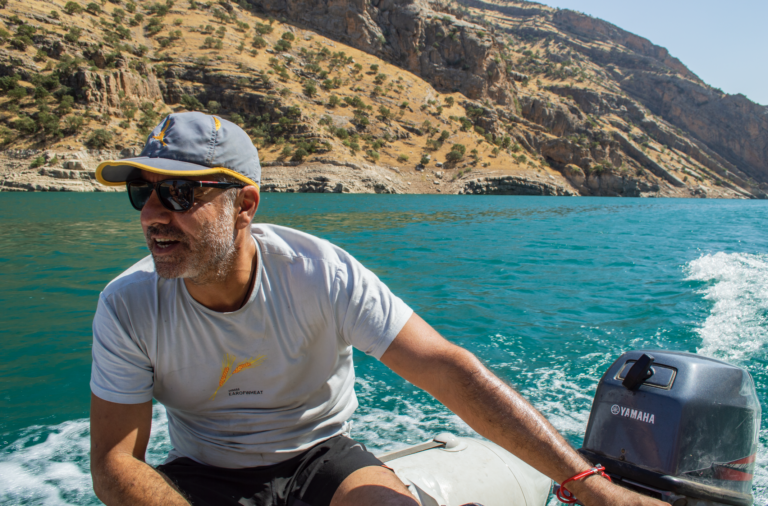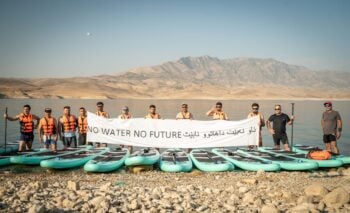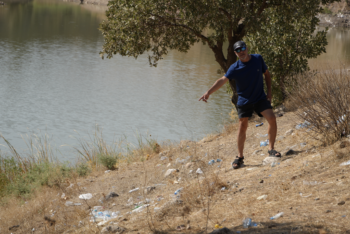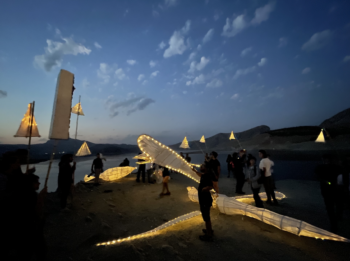Who Is Waterkeeper: Nabil Musa, Waterkeepers Iraq-Kurdistan
By: Thomas Hynes

Nabil Musa grew up in Iraq, but was forced to leave the country in 1996 due to the country’s ongoing military conflict. His childhood was also marred by war, specifically Iraq’s eight year conflict with Iran. When he returned to the country in 2007, the country was again mired in armed battle, this time with the United States. Remarkably, in the middle of all that strife, Nabil turned his focus to protecting Iraq’s natural resources, especially the waterways he grew up loving so much.
When he was a boy, Nabil tended to his family’s flock of sheep. He recalls spending many happy hours by the river. He would swim and fish there. But it was also a sanctuary, and in more ways than one.
“I was born in the war. It was tough and destructive. I’m a full time traumatized human being,” says Nabil. “But how I balanced that as a kid was that I had shelter near the river for myself and my sheeps whenever the planes flew overhead. My river was providing me food and fun, but also safety.” 
Despite his love of water, Nabil’s background is not in ecology or science. He is instead a trained artist and actor. When he left Iraq in the 1990s, he moved to England. It was there he met environmentalists and climate activists. He was drawn to the way these groups would use art to communicate their message. Suffice to say, Nabil was inspired and endeavored to become a full-time activist himself.
In 2007, after over a decade abroad, Nabil was finally able to return home to Iraq.
“When I was in exile for many years, my dream was to go back to the stream where I spent much of my childhood,” says Nabil. “I wanted to first see my family and my parents, and then my river.”
Thankfully, Nabil’s family was safe. The river, on the other hand, was not doing as well. Nabil was heartbroken.
Around this same time, Nabil met an American woman living in Iraq, named Anna Bachmann. Today, Anna works for Puget Soundkeeper as their Clean Water Program Director, but at the time had formed an organization called Nature Iraq to highlight the nation’s natural beauty. Women were not allowed to cross security checkpoints by themselves, so Nabil escorted her around Iraq.
 Nabil told her the story about his childhood and how returning broke his heart. The knowledge Nabil gained from Anna woke him up to what could be done. A few years later, in 2009, he came back again to Iraq. This time Anna had a suggestion for Nabil. She wanted to start a Waterkeeper group in Iraq. Since she wasn’t native to Iraq, she couldn’t lead the organization. Nabil, however, could do it.
Nabil told her the story about his childhood and how returning broke his heart. The knowledge Nabil gained from Anna woke him up to what could be done. A few years later, in 2009, he came back again to Iraq. This time Anna had a suggestion for Nabil. She wanted to start a Waterkeeper group in Iraq. Since she wasn’t native to Iraq, she couldn’t lead the organization. Nabil, however, could do it.
“She told me I could be be a voice for the river,” says Nabil. “I realized that this is the kind of work I want to do. I’m an outdoor person. I spent all of my childhood by the river. I thought to myself: I have a right to do this.”
A year later, he began working on this, and soon thereafter officially launched Iraq Upper Tigris Waterkeeper, the first Waterkeeper group in the Middle East. Waterkeepers Iraq-Kurdistan, a parent organization, was also launched as a way to encourage others in Iraq who were interested in protecting waterways to form their own groups.
Though this was a major accomplishment, there was hardly any time to celebrate. Immediately, Nabil had a lot of work to do protecting Iraq’s neglected waterways. Pollution is a major issue, as is a lack of wastewater infrastructure. About 20 cities in Iraq lack sewage facilities. But it’s not just water quality that keeps Nabil up at night worrying. It is also water quantity. Dams and diversions also pose a threat.
“Not letting rivers flow free scares me,” says Nabil. “It’s bad for all of humanity and the planet. All the destruction has been done by dams. It’s like a blood clot in our system.”
The greatest harm, however, has come from military conflict.
“War destroyed our nature more than anything. Living under the fear of war, the last thing you would give a damn about is the water or the soil or the trees. Unfortunately, that’s still happening,” says Nabil. “But what I thought was: We cannot wait for the war to be over. That’s why our movement is so important. In the middle of war, you talk about positivity and solutions. That’s why it’s so important for us to stick around as Waterkeepers. We are survivors and never act like a victim.” 
To that end, Nabil and his team are constantly focused on problem solving. They are consistently leading cleanups and responding to various environmental crises. Their habitat restoration efforts were recently recognized by the Elevate Prize. Nabil and his team are also working on building prototypes for sewage facilities. They have built a small one to take to universities and other cities to demonstrate how it could help Iraq manage its wastewater. All of these efforts, including the provision of clean water in Iraq, will hopefully bring Nabil a little bit closer to the Iraq of his earlier years.
“I want my river back. I want my childhood dreams back, says Nabil “I go around telling young people, if you’re not careful, the same thing is going to happen to you.”